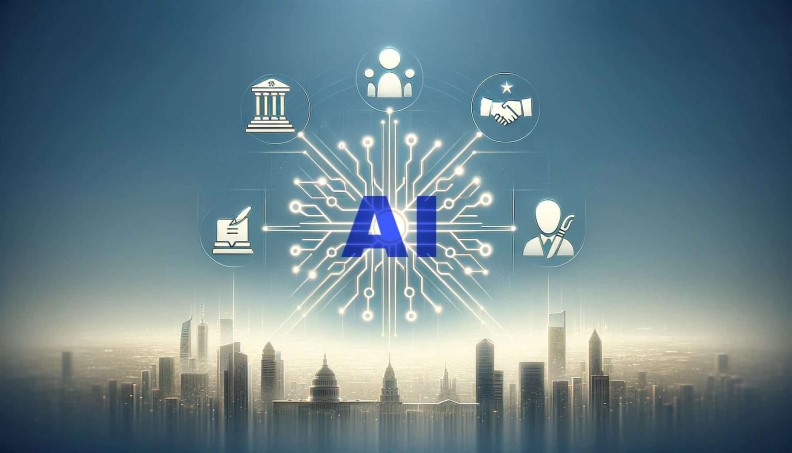
Artificial Intelligence (AI) is rapidly transforming the landscape of various industries, ushering in a new era of innovation and efficiency. AI is not just enhancing existing processes but also creating vast new opportunities for businesses. There are diverse business opportunities within the AI industry. Explore how different sectors are leveraging AI technologies to solve complex problems, streamline operations, and deliver personalized experiences.
AI in Healthcare
The AI industry is rapidly transforming healthcare, presenting significant business opportunities for both startups and established companies. AI technologies are increasingly employed in diagnostics. They help analyze complex medical data to identify diseases earlier and with greater accuracy than traditional methods. Additionally, AI-driven tools enhance patient care management. They accomplish this by optimizing treatment plans and monitoring patient health in real time, leading to improved outcomes.
Furthermore, personalized medicine is another area where AI is making a substantial impact. By leveraging genetic information and individual health data, AI algorithms can tailor treatments to each patient’s unique needs. This not only improves the effectiveness of treatments but also minimizes side effects, enhancing patient satisfaction and care standards.
The integration of AI in healthcare not only boosts the efficiency of medical services. It also opens up new avenues for innovation. Companies can develop AI solutions that assist in everything from robotic surgeries to virtual health consultations. The demand for more sophisticated healthcare solutions continues to grow. Therefore, the potential for lucrative ventures in this sector continues to expand. This makes it a pivotal trend in business opportunities in the AI industry.
AI-Powered Automation in Manufacturing
AI-powered automation is revolutionizing manufacturing, creating substantial business opportunities in the AI industry. Predictive maintenance, one of the most impactful applications, uses AI to monitor equipment and predict failures before they occur. This not only reduces downtime but also extends the lifespan of machinery, significantly cutting costs and enhancing productivity.
Additionally, AI plays a crucial role in supply chain optimization. By analyzing large datasets, AI algorithms can forecast demand more accurately, manage inventory levels efficiently, and optimize logistics. This leads to a more resilient supply chain capable of adapting to changes and disruptions quickly.
The integration of AI with the Internet of Things (IoT) further enhances these capabilities, giving rise to smart manufacturing solutions. These solutions allow for real-time monitoring and control of the manufacturing process, facilitating a highly responsive and adaptive production environment. The synergy between AI and IoT not only streamlines operations but also drives innovation. It opens new avenues for businesses to develop cutting-edge solutions that address complex manufacturing challenges.
Through these advancements, AI is not just improving existing processes but also enabling manufacturers to explore new ways of production, ultimately transforming the manufacturing landscape and expanding the scope of business opportunities within the industry.
AI Applications in Retail
AI is dramatically reshaping the retail industry, unveiling numerous business opportunities in the AI industry for both established players and newcomers. Customer data analytics is a primary area where AI excels, providing retailers with deep insights into consumer behavior and preferences. This data-driven approach enables retailers to tailor their marketing strategies and product offerings to meet the precise needs of their customers, enhancing customer satisfaction and loyalty.
Personalized shopping experiences are another transformative application of AI in retail. By utilizing algorithms that analyze past shopping behaviors, AI can recommend products that align with individual tastes and preferences, mimicking a personalized shopping assistant. This level of customization not only improves the customer experience but also boosts sales conversions.
Moreover, AI significantly enhances inventory management by predicting optimal stock levels, thereby reducing overstock and understock situations. This precision in inventory control helps retailers minimize costs while ensuring that popular items are always available, enhancing overall operational efficiency.
Additionally, AI-powered chatbot services are becoming increasingly prevalent, providing 24/7 customer service that can handle inquiries, assist with purchases, and resolve issues promptly. This constant availability and instant support improve customer engagement and operational efficiency.
These AI applications are not just enhancing the way retailers operate; they are revolutionizing the industry, creating new business models and opportunities for growth. As AI technology continues to evolve, its impact on the retail sector is expected to deepen, driving innovation and profitability.
AI in Financial Services
The AI revolution in the financial services sector is uncovering myriad business opportunities in the AI industry, particularly in areas like fraud detection, risk assessment, algorithmic trading, and personalized customer service. AI’s ability to analyze vast amounts of data at unprecedented speeds and accuracy is pivotal in detecting and preventing fraud. Machine learning models can identify patterns and anomalies that signal fraudulent activities, thereby protecting revenue and enhancing customer trust.
Additionally, AI significantly improves risk assessment processes by providing more accurate predictions based on historical data and real-time information. This allows financial institutions to make more informed decisions, manage risks more effectively, and comply with regulatory requirements more efficiently.
In the realm of trading, AI has transformed traditional methods through algorithmic trading, which uses complex AI models to make high-speed, optimized trading decisions. This not only maximizes profits but also minimizes errors compared to human trading.
Moreover, AI enhances customer service in banking through chatbots and virtual assistants. These AI solutions offer 24/7 customer service, handling inquiries and transactions with speed and efficiency that human agents cannot match. They also personalize interactions based on customer data, improving satisfaction and loyalty.
These applications of AI in financial services not only streamline operations and reduce costs but also open new avenues for innovation and service enhancement, driving the industry forward into a more efficient and customer-focused future.
Ethical AI and Governance
The emerging focus on ethical AI and governance highlights significant business opportunities in the AI industry, particularly in the realms of consultancy and compliance services. As AI technologies become integral to various sectors, the demand for systems that ensure fairness, transparency, and accountability in AI applications is surging. This shift not only addresses societal concerns but also mitigates legal and reputational risks for businesses deploying AI solutions.
Consultancy firms specializing in ethical AI can assist organizations in developing and implementing AI systems that adhere to ethical guidelines and regulations. These services are crucial for maintaining public trust and compliance with increasingly stringent global standards. Moreover, as transparency becomes a cornerstone of AI deployment, companies need guidance on how to communicate AI processes and decisions to their customers clearly and effectively.
Furthermore, accountability in AI involves mechanisms for error checking, auditing, and rectifications. Consultants can provide expertise in setting up frameworks that track AI decisions and provide redressal in cases of mistakes or biases. This level of oversight is essential for industries like finance and healthcare, where AI decisions have significant implications.
The need for ethical AI solutions is creating a new niche within the AI industry, one that promises growth as the technology proliferates across business operations worldwide. Companies that can pioneer in providing ethical AI frameworks and compliance solutions are well-positioned to lead in this evolving market.
Conclusion
In conclusion, the AI industry offers a diverse array of business opportunities across various sectors, including healthcare, manufacturing, retail, financial services, and ethical AI governance. Each area presents unique challenges and immense potential for growth and innovation. As AI continues to evolve and integrate into everyday business practices, the scope for development and profitability expands. Companies and entrepreneurs who can navigate this landscape effectively—by leveraging AI to enhance operational efficiencies, personalize customer interactions, and ensure ethical practices—will find themselves at the forefront of their industries. Embracing AI not only drives technological advancement but also builds a foundation for sustainable, future-proof business models.


